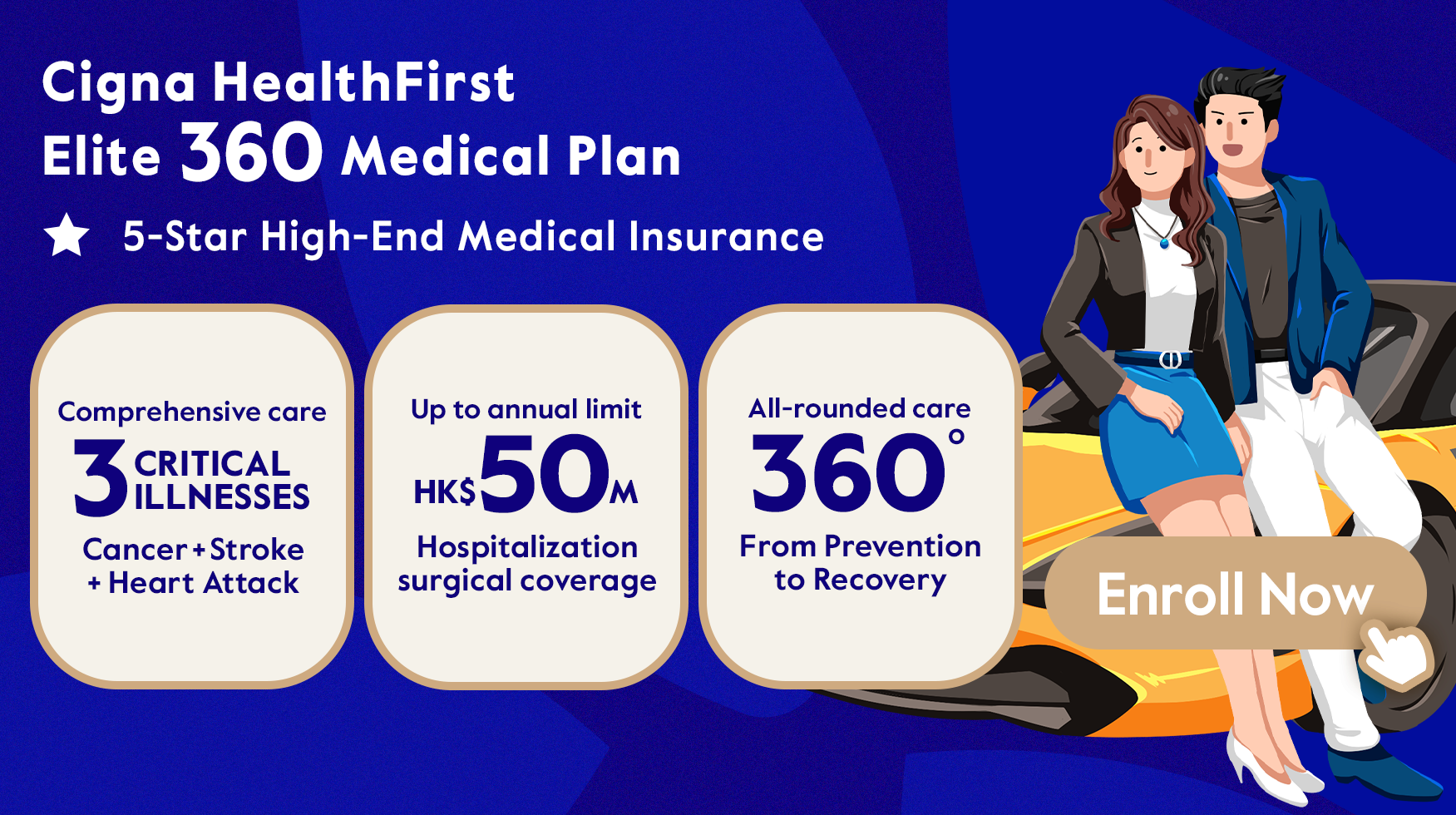Targeted therapy is a popular option in treating Stage IV cancer because of its high effectiveness and substantial side effects. However, the rocket-high costs incurred has limited many’s access to the treatment. Cigna Smart Health gathers information about registered targeted therapy drugs’ fees in Hong Kong and explains their principles, side effects, effectiveness, and related funds in this article.
What is Targeted Therapy?
Targeted therapy is a type of cancer treatment that uses drugs designed to "target" cancer cells without affecting normal cells. Since the side effects of targeted therapy are less than those of chemotherapy, the treatment yields a better result with an increase in patients’ treatment tolerance.
The Principles of Targeted Therapy
Targeted therapies are made to find and attack specific areas or substances in cancer cells or detect and block certain kinds of messages sent inside a cancer cell that tell it to grow. Some of the substances in cancer cells that become the "targets" of targeted therapies are:
- Too much of a certain protein on a cancer cell
- A protein on a cancer cell that is not on normal cells
- A protein that is mutated (changed) in some way on a cancer cell
- Gene (DNA) changes that aren't in a normal cell.
Uses of Targeted Therapy Drugs
- Block or turn off chemical signals that tell the cancer cell to grow and divide
- Change proteins within the cancer cells, so the cells die
- Stop making new blood vessels to feed the cancer cells
- Trigger your immune system to kill the cancer cells
- Carry toxins to the cancer cells to kill them, but not normal cells
Most of the targeted therapy drugs can be further classified into small molecule drugs and Monoclonal antibodies.
- Small molecule drugs: Target a specific substance inside the cells and block them, since the size of these molecules are tiny which help enter a cancer cell.
- Monoclonal antibodies: A bigger size of artificial proteins in our immune system that does not fit to enter a cell.
The most common ways to give targeted therapy drugs are by mouth (as a tablet or capsule) or into a vein (intravenously). A few targeted therapy drugs might be injected under the skin (subcutaneously).
Side Effects of Targeted Therapy
Targeted therapy drugs are less toxic than traditional chemotherapy drugs. However, targeted therapy drugs can have substantial side effects, as shown below.
- Nausea and vomiting
- Diarrhoea
- Liver problem (e.g Hepatitis and elevated liver enzymes)
- Skin problem (e.g Acneiform eruption, Dry Skin, nail changes, loss of hair colour)
- Blood clotting and wound healing problems
- High blood pressure
- Cardiac damage
- Gastrointestinal perforation (a rare side effect for certain targeted therapy drugs)
The severity of side effects can vary greatly from drug to drug and from person to person. Most side effects go away over time after treatment ends and the healthy cells recover. The time it takes to get over side effects varies from person to person. It depends on many factors, including your overall health and the drugs you were given.
Costs of Targeted Therapy Drugs in Hong Kong
According to foreign research and the list of registered targeted therapy drugs in Hong Kong, the table below summarises the average costs per month of the drugs on various cancers for your reference.
| Cancer |
Targeted therapy drugs registered in Hong Kong |
Average costs per month (HKD) |
| Breast cancer |
bevacizumab, everolimus, lapatinib, pertuzumab, trastuzumab and its antibody-drug conjugates |
Approx. $20,000 - $80,000 |
| Colorectal cancer |
aflibercept, bevacizumab, cetuximab, panitumumab, regorafenib |
Approx. $20,000 - $140,000 |
| Lung cancer |
afatinib, bevacizumab, crizotinib, erlotinib, gefitinib |
Approx. $50,000 - $135,000 |
| Liver cancer |
sorafenib |
Approx. $150,000 |
| Head and neck cancer |
cetuximab |
Approx. $15,000 |
| Gastric cancer |
trastuzumab |
Approx. $30,000 |
| Kidney cancer |
axitinib, bevacizumab, everolimus, pazopanib, sorafenib, sunitinib, temsirolimus |
Approx. $20,000 - $40,000 |
| Ovarian epithelial/fallopian tube/primary peritoneal cancers |
bevacizumab |
Approx. $30,000 |
| Pancreatic cancer |
erlotinib, everolimus, sunitinib |
Approx. 120,000 - $27,000 |
| Brain cancer |
bevacizumab, everolimus |
Approx. $20,000 - $70,000 |
The prices of targeted therapy drugs can vary depending on the dosage corresponding to the patient’s weight, frequency period and the types of drugs. For more details, please consult your doctor.
How to Get Funds for Targeted Therapy Drugs
The fees of targeted therapy drugs are hard to afford for many. As such, the government and many social welfare organisations offer various funds to help the people in need.
| Funding Programmes |
Eligibilities |
| and Community Care Fund Medical Assistance Programmes |
|
|
|
| Hong Kong Anti-Cancer Society: Prof. H.C. Ho Memorial Medical Assistance Programme |
|
| Hong Kong Anti-Cancer Society: The Portia Cheung Breast Cancer Support Programme |
|
|
|
|
Cover Your Treatment Costs with a Comprehensive Insurance
Cigna HealthFirst Elite 360 Medical Plan offers comprehensive and personalized medical coverage across the stage prevention, diagnosis, treatment and recovery, with a range of hospital and surgical benefits, optional insurance benefits with an annual limit of up to HK$50 million, personalized health assessment, three critical illnesses(cancer, stroke and heart attack) all-rounded care and international medical concierge service. A 360-degree total health protection that spans across all the key stages of your health journey. Learn more here.
To know more about different cancers, please read the following articles:
- Breast Cancer
- Lung Cancer
- Colorectal Cancer
- Pancreatic Cancer
- Gastric Cancer
- Ovarian Cancer
- Carcinoma In Situ
- Cervical Cancer
- Nasopharyngeal Carcinoma Cancer
- Prostate Cancer
- Esophageal Cancer
- Lifestyle Tips for Cancer Prevention / Beating Cancer Starts with Prevention
Sources:
© Cigna Healthcare 2023
Information provided in this article is intended for health and fitness purposes only and is not intended for use in the diagnosis of disease or other conditions, or in the cure, mitigation, treatment or prevention of disease (see Terms & Conditions for details). Any health-related information found in this article is available only for your interest and should not be treated as medical advice. Users should seek any medical advice from a physician, especially before self-diagnosing any ailment or embarking on any new lifestyle or exercise regime. Any information contained in this article may not be suitable, accurate, complete or reliable. Cigna Healthcare accepts no responsibility for the content or accuracy of information contained on external websites or resources, or for the security and safety of using them. "Cigna Healthcare" and the "Tree of Life" logo are registered trademarks of Cigna Intellectual Property, Inc. in the United States and elsewhere, licensed for use. All products and services are provided by or through operating subsidiaries, and not by The Cigna Group.




